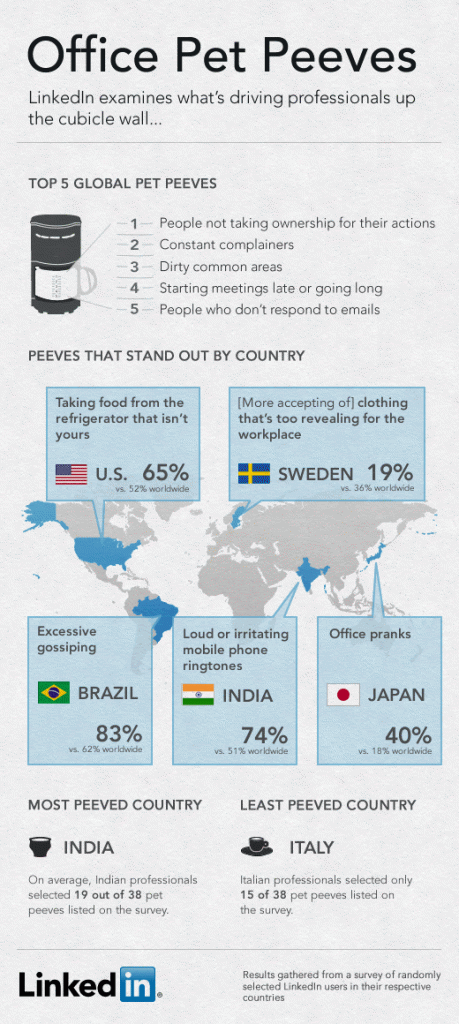 There have been many a time when someone has come rushing into my office, shut the door and said, “OMG, that woman is going to drive me up a wall! She keeps putting all her peanut-buttery dishes in the dishwasher and so we have to run it twice. Just rinse things off!” Maybe it’s not always about peanut butter, and “OMG” might be a bit of an exaggeration, but whether it’s the lady with way too much perfume or the guy who always eats other people’s lunches (happened to me a bunch of times), office pet peeves are a fact of life.
There have been many a time when someone has come rushing into my office, shut the door and said, “OMG, that woman is going to drive me up a wall! She keeps putting all her peanut-buttery dishes in the dishwasher and so we have to run it twice. Just rinse things off!” Maybe it’s not always about peanut butter, and “OMG” might be a bit of an exaggeration, but whether it’s the lady with way too much perfume or the guy who always eats other people’s lunches (happened to me a bunch of times), office pet peeves are a fact of life.
LinkedIn (NYSE:LNKD), the world’s largest professional network with more than 120 million members worldwide, today released data about the top office pet peeves.
“In nearly every office there’s at least one co-worker whose quirks drive colleagues up the cubicle wall,” said Nicole Williams, LinkedIn’s Connection Director and best-selling author of the book, “Girl on Top.” “Sometimes the most irritating office offenders don’t even realize that their behavior impacts the rest of their team. It is crucial for you to solve the annoyance before it disrupts your work performance and career.”
When I spoke with Nicole, she echoed that being self-aware is key for young employees starting out. “Many just don’t realize their behavior may be annoying, and it can be a career killer if you never correct it,” said Nicole. “Young employees may also take the feedback personally and overreact. People aren’t brave enough to point out pet peeves, those behaviors are more delicate and potentially volatile. If someone is taking the time and investing themselves in you by providing feedback, they care enough about you.”
The biggest lesson when it comes to pet peeves? “Be receptive and eager to take the feedback. Say ‘Thank you’ because if you don’t address the behavior, they’ll know you can’t take criticism and won’t want to develop you in the future,” said Nicole.
The survey uncovered some interesting differences across countries and cultures. For example:
- Americans get more irritated than other nationals by co-workers taking others’ food from the office refrigerator.
- Brazilians are the most annoyed of any national group by excessive gossiping.
- Germans are annoyed by dirty common areas (the community microwave or refrigerator) more than the rest of the world.
- Indians react more negatively to irritating mobile phone ringtones.
- Japanese are more peeved by office pranks than others.
There were also gender differences in the findings. For example, 62 percent of U.S. women were bothered by “clothing that’s too revealing for the workplace,” while only 29 percent of U.S. men surveyed said that was a problem. The Swedish are the most tolerant of what others wear in the workplace, but there is still a gender split: revealing clothing irritates 35 percent of the women in Sweden, but only 12 percent of the men.
Regardless of nationality or gender, however, the number one pet peeve of all professionals (selected by 78 percent of the more than 17,000 surveyed globally) is “people not taking ownership for their actions.” And, special note to job seekers: hiring managers in the U.S. are much more peeved than non-hiring managers by people “showing up late for meetings.”
The country with the most pet peeves is India and the one with the fewest is Italy. The U.S. falls right in the middle at number eight out of the 16 countries represented in the survey.
Download the infographic on the LinkedIn office pet peeves data and find out how you can deal with various office peeves on the LinkedIn Blog: http://lnkd.in/office-pet-peeves.





Interesting read! I noticed the Italians are the least peeved nation, it appears. My brief debacle in Spain left my coworkers displeased that I couldn’t brew our afternoon espresso. There were only 10 of us in the office and everyone silently rotated come the a afternoon… When it was my turn, I a) didn’t know and b) didn’t know how to make espresso.
This could be an interesting topic for organisational behaviour, in the inevitable culture clashes that occur working in a global office environment.
Chris, first, thanks so much for the comment (sorry for the late reply), and second, I know what you mean. When I worked in Geneva, we had a little espresso maker. Thank goodness it was one of those individual self-serve pod-style makers, because I wouldn’t have known what to do. But it was true that everyone was supposed to contribute to the general office upkeep…and only a select few did. I’m sure that unless it comes up in your performance review, cleaning your dirty dishes doesn’t seem like something that should be part of the job (as opposed to a common courtesy…) Thanks!
At last some raittnalioy in our little debate.
I’ll without delay grab your current feed as I will not in discovering a person’s e-mail monthly subscription url or publication assistance. Have you got almost any? Nicely told me so that I might just simply subscribe. Cheers.
Hi there my family representative! I wish to declare that this post is amazing, great published and include virtually all vital infos. I must expert excess blogposts like this .